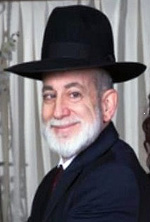What could be wrong? It’s kosher!
By Rabbi Yaakov Marks

SAN DIEGO –“They rose early in the morning and they offered burnt offerings, then they offered peace offerings. Then the nation sat down to eat and drink and performed idol worship.” (Exodus 32:6)
Worship a golden calf?! How could such a thing happen? After witnessing the ten plagues, the exodus from Egypt, the splitting of the sea, the war with Amalek, the Manna from heaven, and the giving of the Ten Commandments from G-d Himself, how, within twenty-four hours, could anyone witnessing such miracles worship a golden calf?
Moshe warned us not to turn after the urges of our heart. He encouraged us to put our focus and efforts into doing what is right and not what we have an urge to do.
King Solomon wrote, “Be happy young man in your youth.” (Ecclesiastes 11:9) Even though this quote was followed by stating, “You will be surely punished,” the Rabbis interpreted the statement to reflect the prevalent philosophy of ‘eat, drink, and be merry for tomorrow you will die’. King Solomon ‘s Kohelet was at first rejected from being placed into the Holy writings because of this statement.
Moshe had written “do not turn after your heart,” condemning any uncontrolled involvement in pleasure; King Solomon seemed to say the opposite: “Enjoy yourself when you are young.” The rabbis were bothered with these words which sounded like heresy.
In addition, the rabbis also said that “Whenever you eat, you have the evil inclination’s influence.” Isn’t eating permissible and… rather necessary? Why would eating cause bad things? How could people who saw all the miraculous deeds of G-d do such a grave sin?
Every person has both a physical drive that pushes indulgence and satisfaction of his bodily pleasures and a spiritual drive which fulfills the needs of the soul. The soul of a person longs to get close to G-d; on the other hand, his body lusts for pleasure. When a person acts without thinking about what he is doing, his physical desires usually control his actions.
Just because something is permissible does not mean it is the right thing to do. When a person is eating, even though eating is, of course, necessary, he still needs to be careful. Someone who becomes involved in an act with the proper thought will stay within the proper parameters. However, when a person doesn’t give his actions the proper thoughts, his physical drive will allow him to eat what he sees justifying that action because “it’s kosher!” It’s a Mitzvah!” Without the proper thought, he will slowly move out of the realm of permissible, drifting into the realm of what is wrong. He will delude himself by saying, “It’s permissible,” as he slowly sinks down to what is no longer allowed.
King Solomon was not arguing with Moshe. On the contrary, he was agreeing with him. King Solomon told the young man that he will see a lot of permissible things to do when he is young and energetic, but he must remember that if he becomes tempted to try what is not appropriate or correct he will have to pay for it in the end. Just because something is permissible does not mean it’s right. Eating cake and candy is permissible, but if eaten without restraint it will eventually cause the obvious negative results. All of us can grasp why we should be responsible for the result of our actions – even though they may have been permissible.
This is what happened at the time of the golden calf. Yes, the people saw all the miracles, but they still had their physical desires. The fact that in their minds they thought that Moshe was late returning to them caused them to lose focus. When they awoke early in the morning to make offerings, they were doing that for G-d. As time, progressed, they began to make peace offerings, and even though this was for G-d, they received a portion of those offerings and were having pleasure. Soon, they descended one more level and “ate and drank”. Permissible, but G-d was no longer included. They slid slowly further down, always justifying their actions, believing that what they were doing was permissible. It might have started out within the range of permissible, but without proper thinking, without using proper restraint, they slowly continued to descend until they were actually giving their offerings to a golden idol.
We must constantly track and monitor the source of our actions. Are we doing what we do with the desire to get closer to G-d or are we merely fulfilling our physical desires? When we sit down to eat and we proclaim, “It’s Kosher!” “It’s permissible!” are we using the food to get closer to G-d or to satisfy our desires? King Solomon tells us that we need to think about the outcome of our actions. We are going to have to bear the effects of our actions.
May we have the wisdom and strength to properly evaluate our actions. May we have the capacity to foresee the outcome of our deeds. May we be blessed that what we do brings us pleasure in our youth and old age and not have to bear the pain of a reckless youth.
*
Rabbi Marks is a life and health coach, who may be contacted via ahealthyrabbi@gmail.com